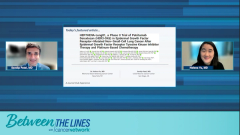
HER3-DXd Safety and Strategies to Optimize Patient Outcomes
Dr. Yu and Dr. Patel examine the safety profile of patritumab deruxtecan, including adverse event monitoring and management approaches to optimize patient outcomes.
Episodes in this series

This is a synopsis of an Insights series featuring Helena Yu, MD, of Memorial Sloan Kettering Cancer Center, and Sandip Patel, MD, of UCSD Moores Cancer Center.
The discussants reviewed safety data for the antibody-drug conjugate (ADC) patritumab deruxtecan (HER3-DXd) from the phase 2 HERTHENA-Lung01 trial in EGFR-mutant non-small cell lung cancer.
Dr. Yu highlighted paying close attention to adverse events (AEs) requiring treatment discontinuation, which occurred in 7.1% of patients on this study. Another key toxicity with ADCs incorporating the deruxtecan payload is interstitial lung disease (ILD), which an independent committee adjudicated as occurring in 5.3% here. The most common AEs were cytopenias, though rates of febrile neutropenia or bleeding were low.
Dr. Patel raised an interesting point around managing ADC toxicities, as their “targeted chemotherapy” mechanism confers adverse effects of both modalities. Unlike pure antibodies, ADCs often require chemotherapy-like dose reductions or delays for cytopenias rather than flat discontinuation. He advocated for close lab monitoring, particularly early on, to avoid severe blood count drops. ILD remains challenging due to difficulty distinguishing from cancer symptoms or other etiologies.
Dr. Yu indicated the 5.6 mg/kg dose optimally balances efficacy and toxicity. She uses growth factor support for significant neutropenia and readily dose reduces if needed. She also noted the need to study managing palliative radiation with ADCs given their lingering chemotherapy payloads. Dr. Patel concurred that holding treatment for a full cycle during radiation is reasonable to avoid additive toxicity. He reiterated that real-world data will further inform optimal sequencing as ADC use increases.
In summary, the toxicity profile of HER3-DXd includes modest rates of severe hematologic and lung toxicities. Dose modifications akin to chemotherapy and holding treatment around palliative radiation are common-sense strategies for managing ADC side effects, though formal guidelines are lacking. Continued research is needed on defining best practices for administering ADCs safely as their clinical applications broaden.
*Video synopsis is AI-generated and reviewed by Cancer Network editorial staff.
Newsletter
Stay up to date on recent advances in the multidisciplinary approach to cancer.






































